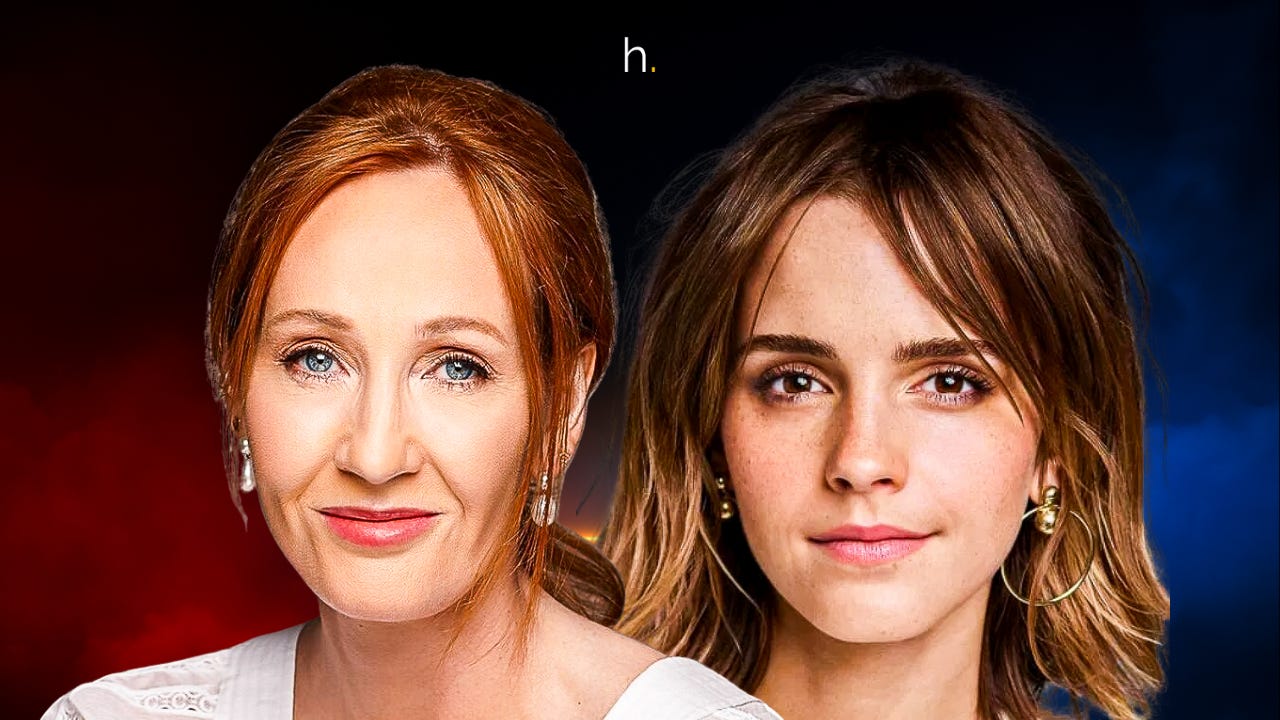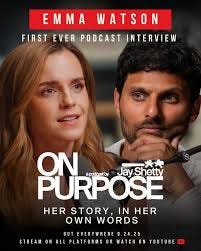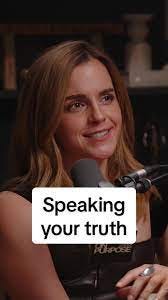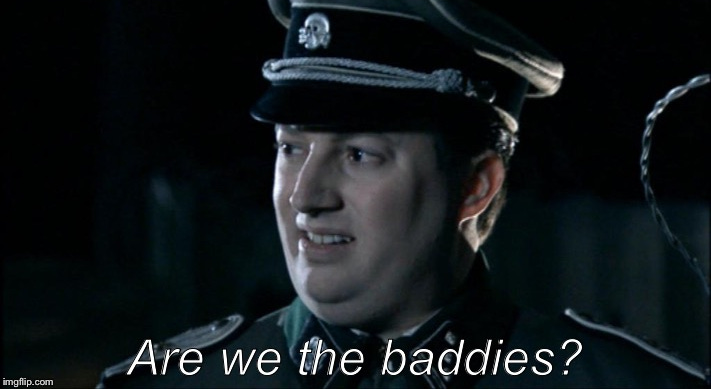What Do We Do With The Emma Watsons?
JK Just Hit Back - Is Peak Trans Dead?
Article 1. What Do We Do With the Emma Watsons?
Article 2. DEI Lawyers Are PROUD - Rupert Lowe Reacts
“You are evil. End of.”
“Ignorant fool who sidled up to men sending r-pe and death threats to JK Rowling.”
“What is the point of Emma Watson?”
These are the first words I found about the Hermione actress when you type her name into the search on X. It got me thinking: “Did Watson see this coming?”
By now, many of you will have seen that she went on a podcast (yet, few will have been able to get past the excruciating first few minutes of it). You will have watched the clips of Watson speaking about the Harry Potter writer who made her career. You’ll also have read JK Rowling’s stunning retort.
What makes an Emma Watson? How has Hollywood produced so damn many of them? Let’s embark on a journey together and…hold space for one another.
That’s the kind of gobbledy-gook that punctuates sentences on the podcast of British-Indian megastar Jay Shetty. And boy is he a megastar. 18 million followers on Instagram. 5 million on YouTube. This guy - whom I knew very little about - is huge. And so his interview with Emma Watson was destined to make a dent in our social fabric.
Emma, who rarely gives interviews, knew this. We can therefore take her words in the podcast as an attempt at direct communication - perhaps a misguided olive branch - with JK Rowling.
“The thing I’m most upset about is that a conversation was never made possible,” she sighed.
The Jay Shetty podcast can be almost spiritual in its pop psychology (Shetty claims - spuriously - that he lived as a monk in India for three years). In these realms, it’s normal for celebrities to use the passive voice to absolve themselves of responsibility.
If a tree falls and no one hears it, is it a celebrity’s fault?
Is a bespoke, hand-carved walnut table truly a table when we are all made of the same atoms?
Can a conversation that “wasn’t made possible” ever have been possible?
No, no. It’s the conversation’s fault!
But a more honest, less hokey statement would have been:
“Rather than reach out to JK Rowling personally, I denounced her in public while thousands sent her death threats. I made that conversation not happen. I regret it now that my views are less fashionable.”
What had Watson said about Rowling?
Most grating - the “turning point” for JK Rowling - was when she declared at an awards ceremony: “I’m here for ALL of the witches”. This was a thinly-veiled dig at JK Rowling, using her own creation against her. It was low.
The implication was that JK Rowling is - like the villains of the Harry Potter series - only “here” for the pure bloods. I don’t think it’s going too far to suggest it is effectively labelling her a Nazi.
Yet, things are more complicated than many would have you believe. In her response, Rowling voiced an opinion that I have long held.
“I’m not owed eternal agreement from any actor who once played a character I created. The idea is as ludicrous as me checking with the boss I had when I was twenty-one for what opinions I should hold these days.”
Like Rowling, I found it bizarre that so many commentators have promulgated this idea that actors mustn’t diverge from the political beliefs held by the writer of their big-break movies. To give an extreme example, Harvey Weinstein made a lot of young people famous. I wouldn’t expect them to feel obligated to support him.
However, specific turns of phrases aimed to hurt JK Rowling - such as the “ALL of the witches” nonsense - make for a perversion of her work and the truth and do therefore hint at ingratitude. It’s particularly egregious, given the ‘sass’ accompanying Watson’s smirk when she recited a line she must have practiced in the mirror 100 times.
That said, are we expecting too much of the Emma Watsons and Daniel Radcliffes of this world?
The best part of Rowling’s sparkling response is where she writes:
Emma has so little experience of real life she’s ignorant of how ignorant she is. She’ll never need a homeless shelter. She’s never going to be placed on a mixed sex public hospital ward. I’d be astounded if she’s been in a high street changing room since childhood. Her ‘public bathroom’ is single occupancy and comes with a security man standing guard outside the door.
Has she had to strip off in a newly mixed-sex changing room at a council-run swimming pool? Is she ever likely to need a state-run rape crisis centre that refuses to guarantee an all-female service? To find herself sharing a prison cell with a male rapist who’s identified into the women’s prison?
This speaks right to the heart of the trans debate, which the science-based gender-realist side has won in the UK.
In fact, this goes beyond trans. This is the “Anywhere People” vs “Somewhere People” concept playing out in real life. The “Anywhere People” are international jet-setters whose empathy doesn’t extend to the plight of the “Somewhere People” who can’t just up and leave at a whim.
The “Somewhere People” are those with real experience of council-run swimming pools and state-run rape crisis centres, while Watson - the epitome of “Anywhere” - revels in fashionable luxury beliefs that make her look and feel good.
So good, in fact, that she’s still fighting Voldemort in her mind.
Watson was accompanied to her graduation by a security team that escorted her to the bathroom. How can we expect her opinion of societal matters to reflect a society she hasn’t been part of since she was 11?
This mirrors the immigration issue, in that “Anywhere People” can’t even imagine what it might be like to have their entire neighbourhoods turned into refugee centres. They cannot fathom it. Must just be racists.
And for that reason, I sympathise with Emma Watson the individual, even as I despise the Hollywood class she represents. She has no idea. How could she?
On the podcast, she even suggested people “can’t talk about Palestine” - this, on the back of ceaseless awards speeches by Pro-Palestine loonies such as Javier Bardem. In the real world, people on both sides realise it is the most talked-about war in modern history. Jewish actors I know are being forced to hide yellow ribbons calling for the return of hostages, unable to speak openly at all.
But Watson could never imagine that she might be with the Death Eaters.
She was thrust into a world in which she is expected to have an opinion on everything, while knowing nothing about anything.
I don’t hate the person. I hate the ideology.
And that’s the point. It’s not Watson herself, but the rarefied world she inhabits - a world where therapy-speak replaces responsibility, and luxury beliefs stand in for moral courage.
In the end, Emma Watson’s words are less a bridge to Rowling than that walnut table: smooth, expensive and ultimately useless to the people who can’t even afford a chair - a perfect monument to Hollywood morality.
DEI Lawyers Are PROUD - Rupert Lowe Reacts
I was scrolling - of all things - LinkedIn (the worst and fakest of all social platforms), when I noticed my recent Heretics guest Rupert Lowe had posted something worrying.
Sign up to support Heretics and read the rest of this article.







